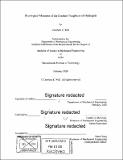| dc.contributor.advisor | Gareth H. McKinley. | |
| dc.contributor.author | Will, Carolynn E. | en_US |
| dc.contributor.other | Massachusetts Institute of Technology. Department of Mechanical Engineering. | en_US |
| dc.date.accessioned | 2022-08-31T16:13:54Z | |
| dc.date.available | 2022-08-31T16:13:54Z | |
| dc.date.copyright | 2020 | en_US |
| dc.date.issued | 2020 | en_US |
| dc.identifier.uri | https://hdl.handle.net/1721.1/145220 | |
| dc.description | Thesis: S.B., Massachusetts Institute of Technology, Department of Mechanical Engineering, 2020 | en_US |
| dc.description | Cataloged from the official PDF of thesis. | en_US |
| dc.description | Includes bibliographical references (pages 36-37). | en_US |
| dc.description.abstract | Hydrogels are pertinent to many applications, including tissue engineering, contact lenses and drug delivery. However, traditional tensile tests cannot be performed on soft hydrogels due to the soft and sometimes transient nature of their stiffness response. To address this issue, a method is proposed to determine the fracture toughness of a notched hydrogel using rheology, as opposed to tensile tests. Notched polyacrylamide hydrogels underwent constant strain rate tests on a rheometer to fracture the samples. Tensile tests were performed on notched samples as a baseline for comparison. Both tests used hydrogels with varying crosslinker concentration. Rheology tests were performed with varying testing conditions. The hydrogels were created using a Teflon spacer sandwiched between acrylic plates to induce the notch in the sample. Tests were performed with the hydrogel removed from the spacer with mineral oil and also with the hydrogel remaining in the Teflon spacer with mineral oil to reduce abrasion during shear, and finally with the hydrogel in the Teflon spacer without mineral oil. Several different strain rates were tested. A comparison between fracture toughness values obtained from tensile tests and the rheology tests revealed that rheology resulted in similar fracture toughness values. This is a positive indication of the ability to use rheology to measure nonlinear properties of soft materials. Varying the testing procedure is important to eventually determine the optimal way for a soft hydrogel to be tested. In this study, tests performed with the hydrogel in the Teflon spacer resulted in lower fracture toughness and critical strain. A strain rate dependence of the fracture toughness and critical strain was also found for the hydrogel. This information about the response of the materials to different testing conditions will be valuable for testing soft gels using rheology moving forward. | en_US |
| dc.description.statementofresponsibility | by Carolynn E. Will. | en_US |
| dc.format.extent | 37 pages | en_US |
| dc.language.iso | eng | en_US |
| dc.publisher | Massachusetts Institute of Technology | en_US |
| dc.rights | MIT theses may be protected by copyright. Please reuse MIT thesis content according to the MIT Libraries Permissions Policy, which is available through the URL provided. | en_US |
| dc.rights.uri | http://dspace.mit.edu/handle/1721.1/7582 | en_US |
| dc.subject | Mechanical Engineering. | en_US |
| dc.title | Rheological measures of the fracture toughness of hydrogels | en_US |
| dc.type | Thesis | en_US |
| dc.description.degree | S.B. | en_US |
| dc.contributor.department | Massachusetts Institute of Technology. Department of Mechanical Engineering | en_US |
| dc.identifier.oclc | 1342119844 | en_US |
| dc.description.collection | S.B. Massachusetts Institute of Technology, Department of Mechanical Engineering | en_US |
| dspace.imported | 2022-08-31T16:13:54Z | en_US |
| mit.thesis.degree | Bachelor | en_US |
